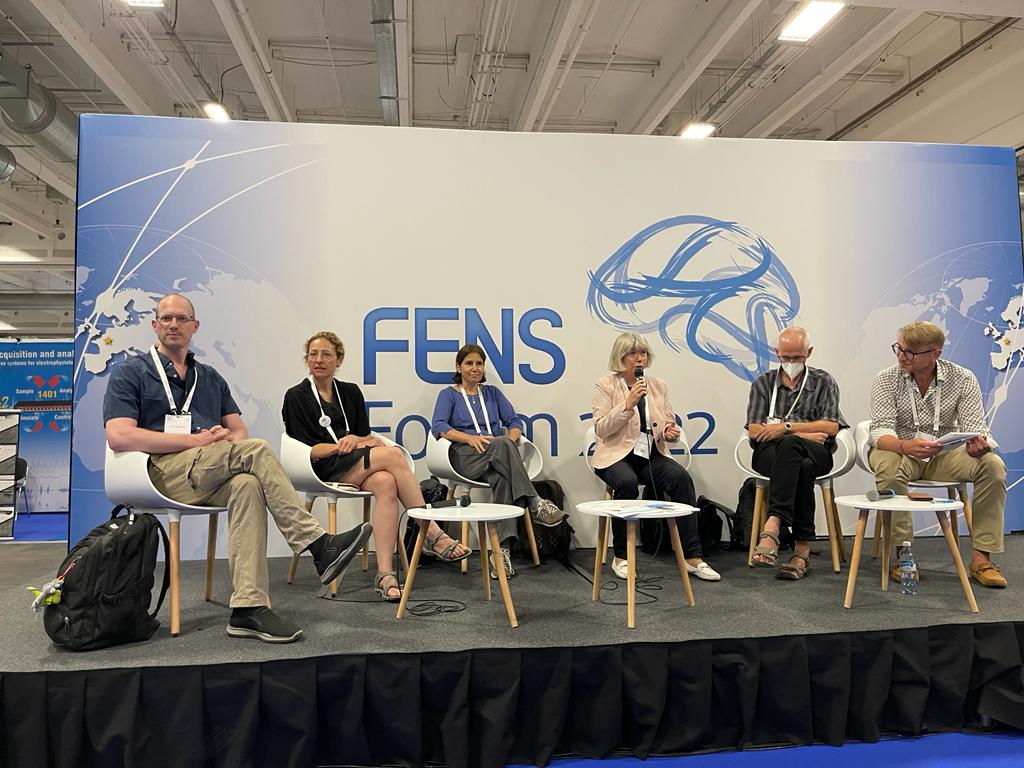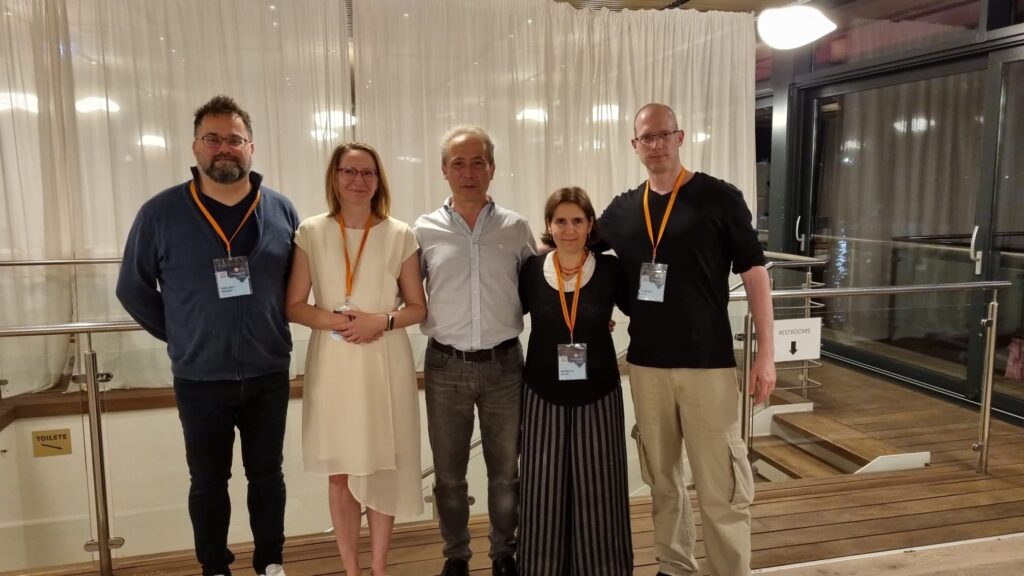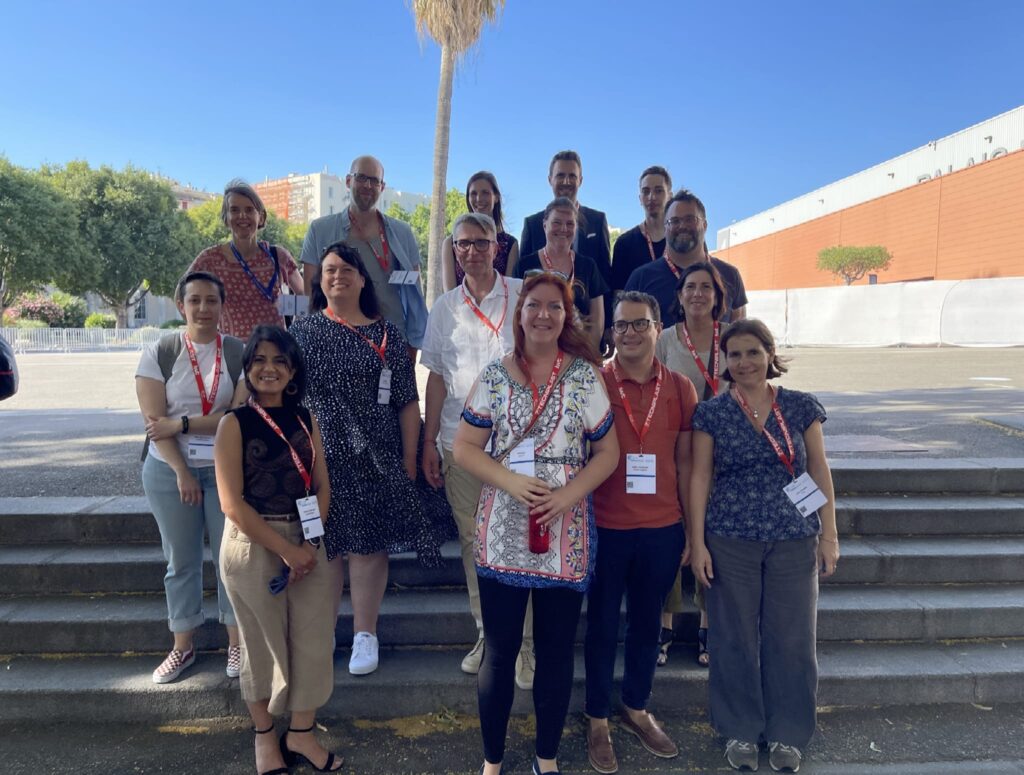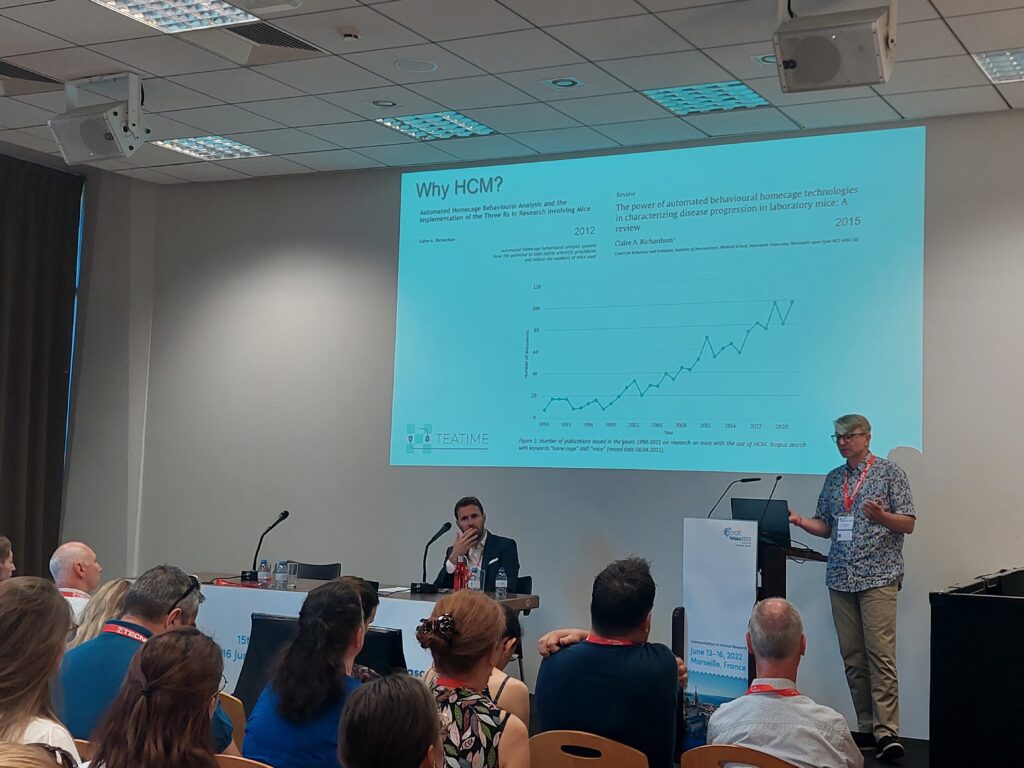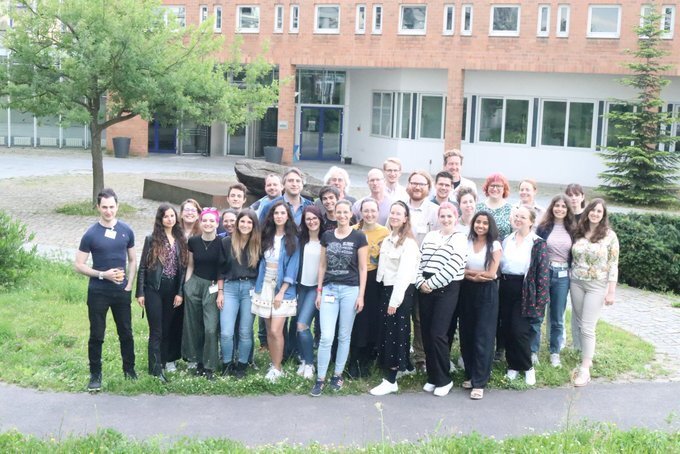
The second Advanced Training School took place in June 2024 in Berlin at the German Federal Institute for Risk Assessment (BfR). Out of 60 applicants, 22 young scientists from 13 European countries were invited to learn more about the use of home cage based technologies to monitor rodents in research. The students’ participation was fully funded by COST.
The various presentations focused on ways to improve the standardisation and reproducibility of behavioural testing. In addition to commercially available home cage based set-ups, self-developed set-ups were presented and examples of their use were given. The importance of home cage testing for animal welfare was also discussed.
The options for building self-made systems or replicating existing ones are becoming increasingly diverse. Therefore, a workshop was held with a very simple example of how to build a simple prototype to measure activity in the home cage. Participants were guided through the building instructions step by step, so that by the end everyone had their own small device. The workshop was designed to give participants a first experience of building their own devices and to overcome any fears they might have.
Interacting and networking with each other and the experts was an important part of the Training School. Many opportunities were provided for this, including breaks, lunches and the various evening events.
|
In celebration of International Women’s Day 2024, we are pleased to share with you insights of some of the amazing female researchers in our Action
Every year International Women’s Day is an excellent opportunity to hold on for a moment and to reflect on the specific contributions of women to our societies and our well-being, and to potentially look for role models. This year, we @COST-TEATIME asked the marvellous female scientists in the leadership of our Action what drove them to pursue a career in science, what motivates them and what they gained so far from the participation in the leadership of a COST Action. We are very happy about the responses we got and think they pretty much reflect the science-driven and collaborative spirit we perceive within our Action. Take a look at their statements and see for yourself!
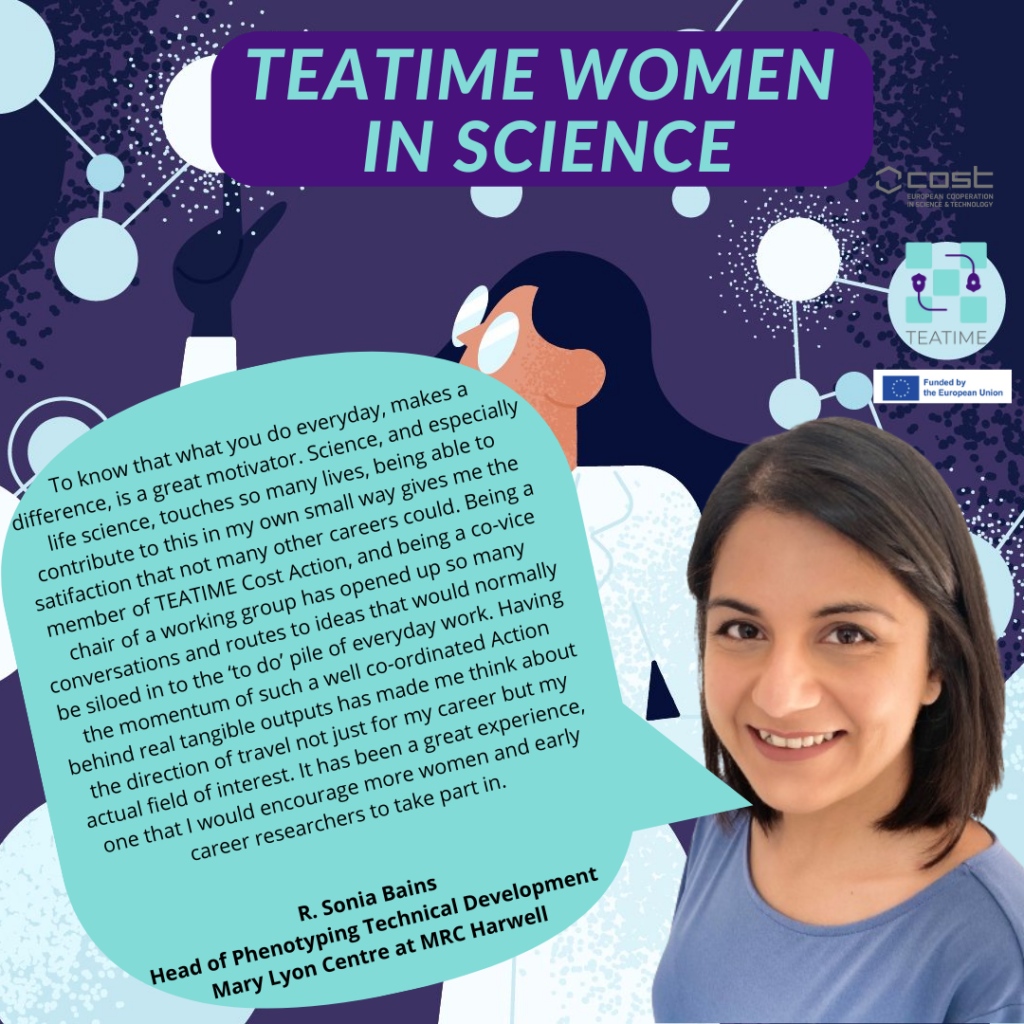
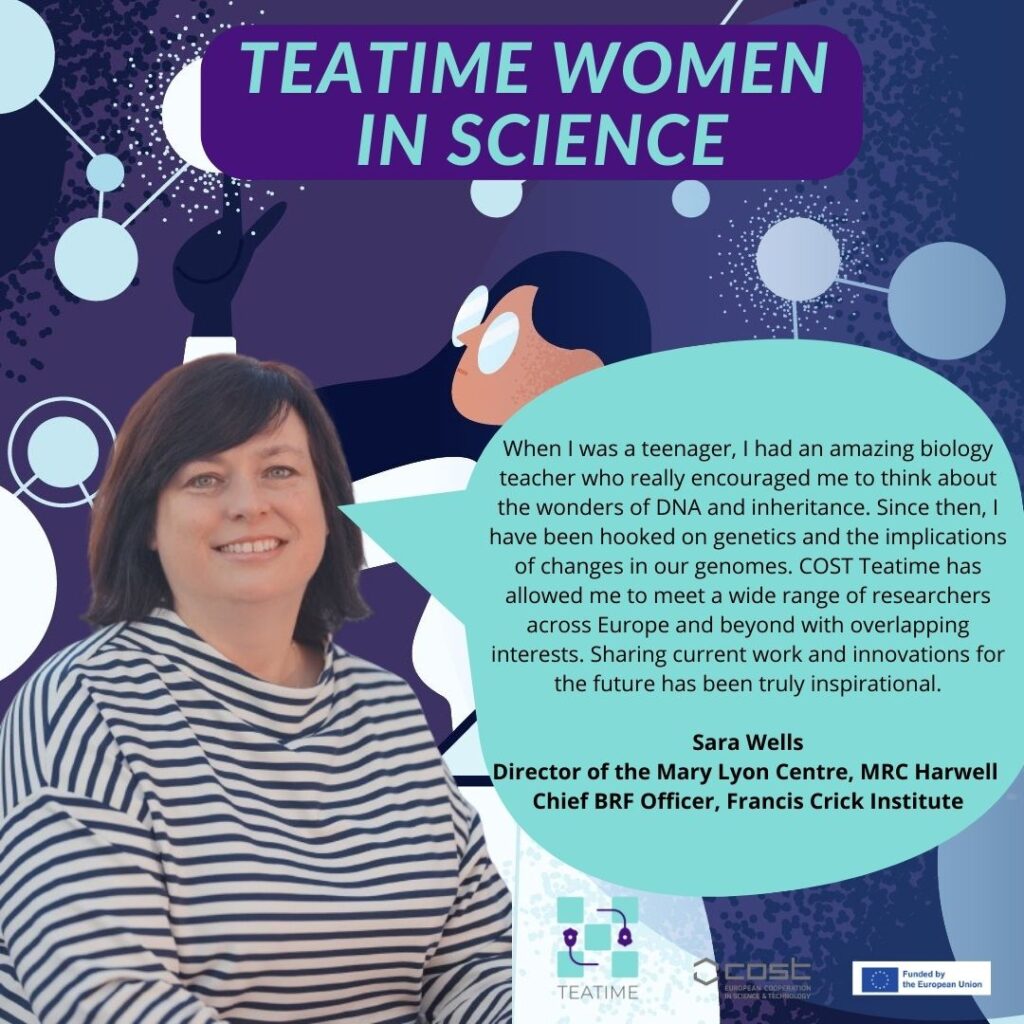
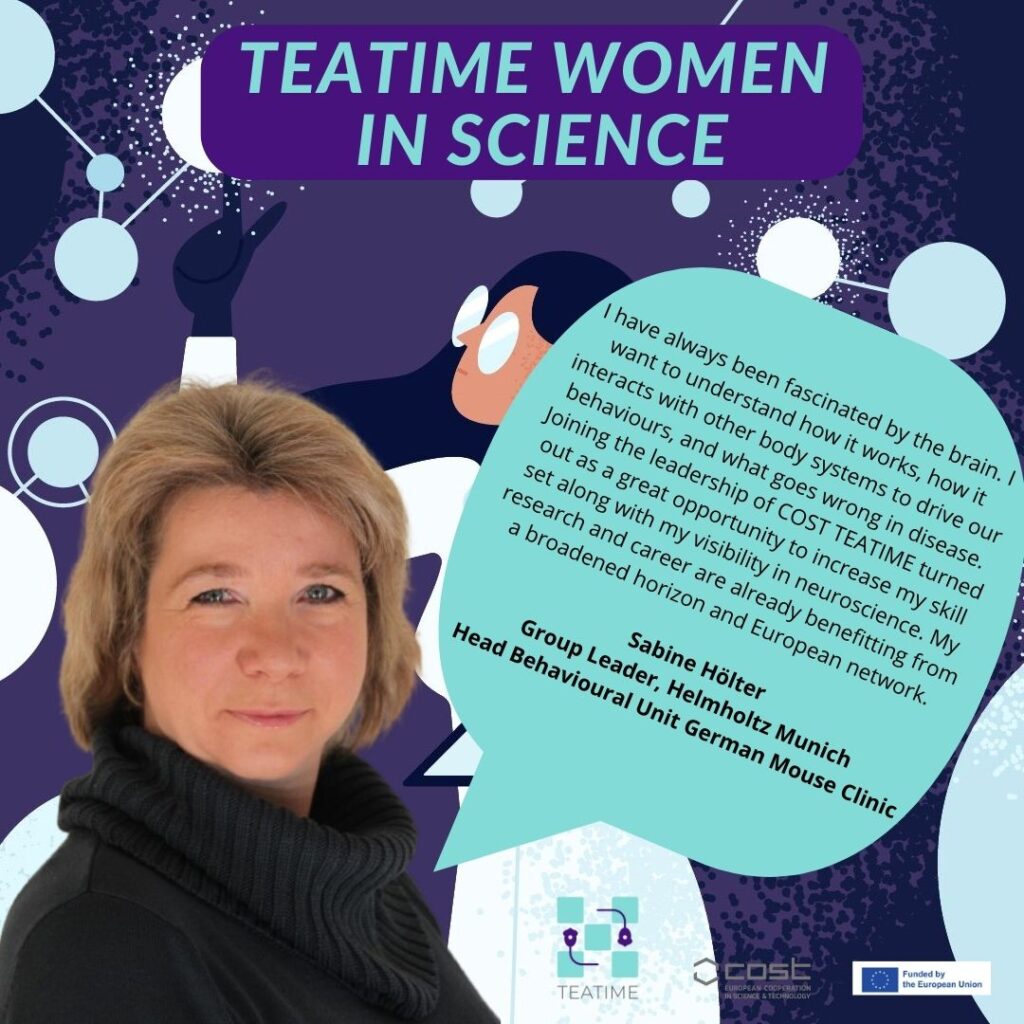

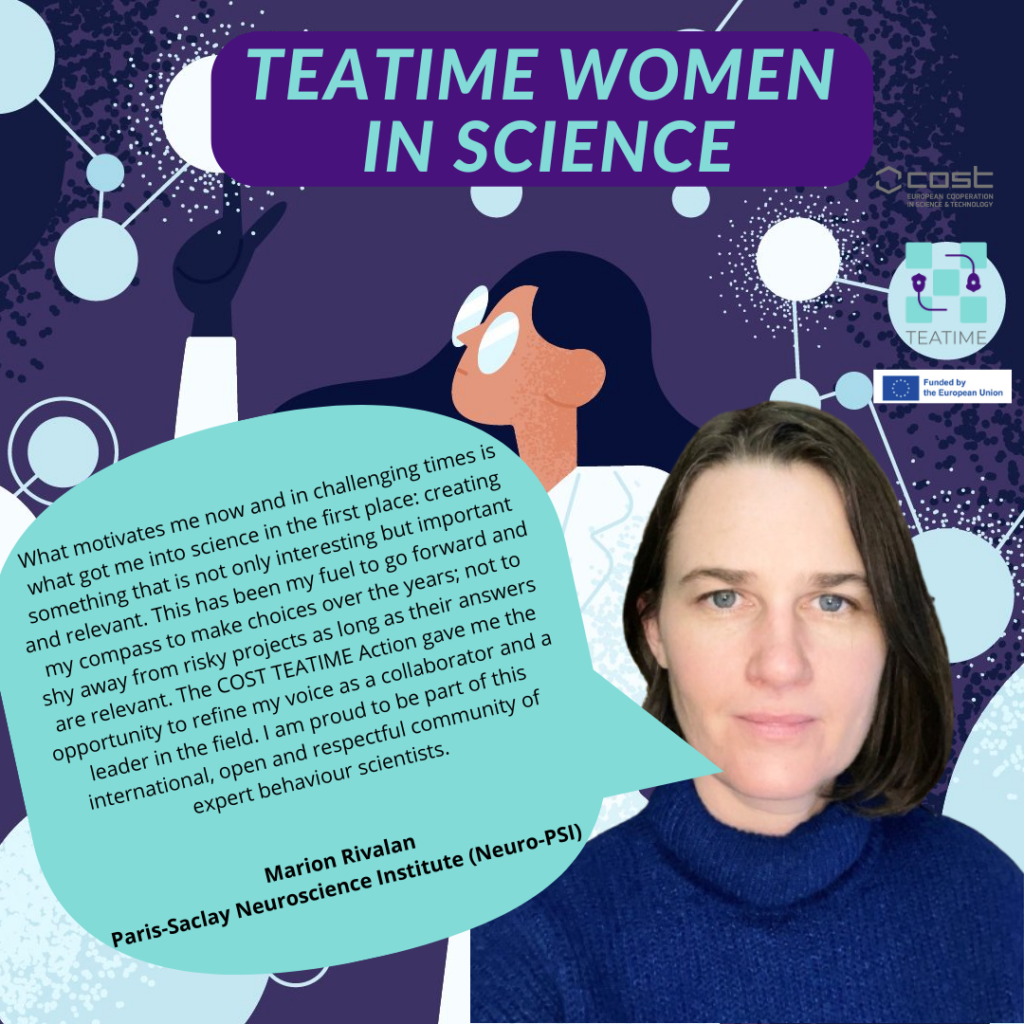
|
This autumn we have unveiled a comprehensive paper delving into the transformative potential of home-cage monitoring technology (HCM) in the realm of biomedical animal research. Traditionally, laboratory rodents undergo individual examinations in external test apparatuses at specific time points, a practice that may overlook crucial data influenced by various factors. To address these limitations, the research community has increasingly turned to longitudinally monitoring mice and rats within their home cages. The recently published systematic review, drawing insights from 521 publications sourced from PubMed and Web of Science, sheds light on the evolution of HCM and its current state-of-the-art applications.
Over the covered period, numerous studies have shown a remarkable enhancement in techniques for HCM of mice and rats. The ongoing development signifies a promising trajectory for the field, indicating that continuous, longitudinal, and non-invasive monitoring of various parameters in group-housed small rodents within their home cages is within reach. By monitoring animals in their home cages over extended periods, we can capture a more accurate representation of their natural behavior and physiological responses. This not only enhances the reliability of our findings but also opens up new possibilities for studying a broader array of parameters in a group setting. The implications of this research extend beyond mere technological progress. The ability to monitor animals continuously within their familiar environment holds the potential to revolutionize experimental designs, offering a more comprehensive understanding of the impact of various interventions and stimuli. As the field of HCM continues to evolve, researchers anticipate further refinements and validations of monitoring systems. These improvements will inevitably broaden the applications of HCM, allowing for a nuanced understanding of the intricacies of animal behavior and physiology over time.
In conclusion, the paper signifies a pivotal moment in biomedical research, highlighting the strides made in home-cage monitoring technology and hinting at a future where the continuous observation of small rodents within their home cages becomes standard practice in laboratories worldwide.
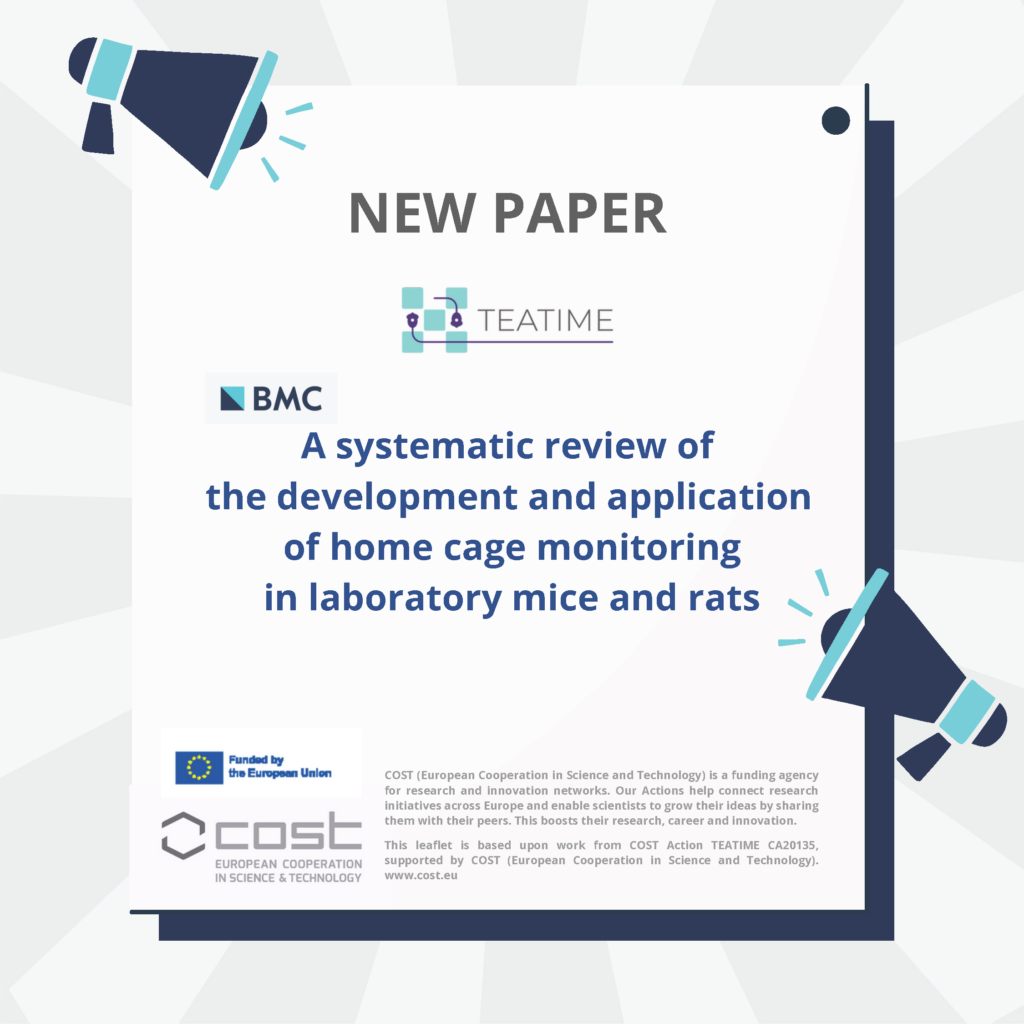
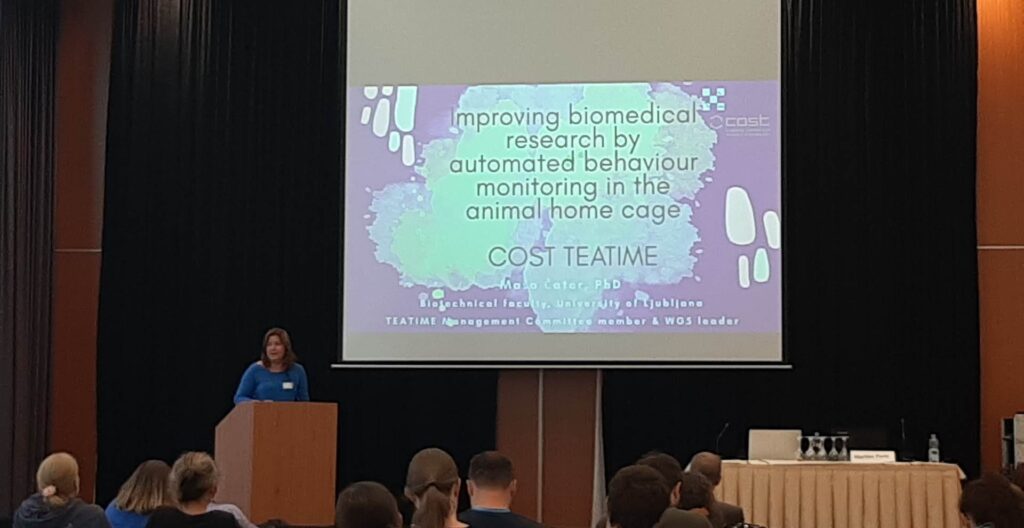
I was privileged to present the groundbreaking TEATIME Action at the 5th Congress of the Society for Laboratory Animals of Slovenia and the 3rd joint SLAS – CroLASA meeting on June 15, 2023, in Ljubljana, Slovenia. My lecture focused on the transformative potential of automated behavior monitoring in the home cages of laboratory animals, particularly mice and rats, aiming to elevate the standards of biomedical research.
TEATIME Action, launched in 2021 and spanning 34 European countries, unites experts in mouse behavior, data science, and animal welfare. Focused on home cage monitoring (HCM) technologies, it aims to enhance the reliability of measures in laboratory rodents, setting standards for ethical preclinical research. TEATIME fosters collaboration through surveys and a systematic review, providing a catalog of HCM systems and offering training programs. This initiative not only refines experimental conditions and reduces animal use but also builds a diverse, interconnected network for a more ethical and efficient future in biomedical research. The abstract of the lecture can be found in the Book of Abstracts (1 (slas.si)).
As the topic unfolded, I was delighted to witness the audience’s curiosity ignite. The flood of questions that followed indicated a genuine interest in the subject. What thrilled me even more was the realization that the information shared was breaking new ground for many researchers. Some attendees were encountering the fascinating realm of Home Cage Monitoring (HCM) systems for the first time. The allure of our shared mission—improving research using laboratory animals—resonated with fellow researchers. Many expressed not only their desire to learn more but also their interest in joining our Action. It’s the kind of collaborative spirit that propels our collective pursuit of knowledge forward. The exchange of ideas and the prospect of forging new connections left me inspired and excited about the collective journey ahead.
dr. Maša Čater
Biotechnical faculty
University of Ljubljana
Slovenia
|
|
|
Over the last two years, this acronym has become a keyword for more than 100 European researchers, signaling not only the latest art in monitoring of experimental animals, but also communication and collaboration.
It all started exactly when the first wave of the COVID-19 pandemic hit Europe, in March 2020. A group of preclinical researchers specialized in behavior analysis of animal models established a working group which grew rapidly. Many of us knew each other already, but all the work to establish this project was done via virtual meetings. By October 2020, we had a community of more than 50 researchers from 23 European countries who reached a consensus to submit a proposal for the COST Action. COST Actions are bottom-up networks enabling researchers and innovators to grow their ideas and share them with their peers. The proposal was approved for funding in May 2021 and the project kicked off in October 2021 when the first Management Committee meeting was held virtually. Thereafter, it began to rapidly attract more researchers to join. As of September 2022, the network consists of more than 120 researchers from 34 European countries working in various fields of biomedicine, laboratory animal science, data science and technology providers.
Laboratory animals are used throughout the biomedical field of research to study physiological and pathological conditions in living organisms with the ultimate aim to understand the mechanisms and to develop treatments for human and animal disorders. More than 70% of the total number of animals used for this purpose in Europe are mice and rats. This work is guided by the principles of the 3Rs (Replacement, Reduction, Refinement), where developing refined experimental conditions could substantially improve animal welfare and, importantly, enhance the translational value by improving quality and reproducibility of the data. There are also implications in regard to Reduction, as more accurate and reliable data reduces the waste of animals in unreproducible research. Additionally, the ability to monitor animals without disturbance can reduce variability caused by handling stress, thus allowing for a better ‘signal-to-noise’ ratio, with fewer animals thus being required to detect a given effect size.
In a nutshell, the main aims of the Action are (i) to develop a framework for enhancing the sensitivity, reliability, and reproducibility of behavioral and physiological measures from laboratory rodents in a home cage; (ii) to strengthen pan-European preclinical research by establishing standards and guidelines in promoting emerging tools for home-cage monitoring; and (iii) to improve data relevance and reproducibility in compliance with animal welfare and ethical considerations. The objectives of the Action are further discussed in a recent perspective article in Laboratory Animals https://journals.sagepub.com/doi/10.1177/00236772221117451
The Action has five working groups, 3 of them focused on generating the knowledge and the remaining two at generating the output. In order to achieve our aims, we are seeking for substantial outreach and a critical mass of researchers to join the network or follow our progress via our website, our social media accounts or publications. One of our first steps has been to gather community requirements for Home-Cage Monitoring (HCM), i.e. 24/7 collection of data in undisturbed animals in their home environment. To this end we conduct a survey.
HCM is not only a tool for behavioral scientists, as welfare assessments rely mostly on behavior and physiology and any intervention can cause alterations in any of the measured parameters. We are working on a systematic review of the existing (and published) HCM methodologies, and developing a framework for an enhanced definition of HCM (see https://www.cost-teatime.org/about/olog/). The concept of ‘home cage’ itself has led to interesting debates in our network. Our current aim is therefore to generate a searchable catalogue of HCM methods, accompanied by keywords, glossary, references and general guidance. Another major challenge posed by HCM systems is that of collecting, handling, mining and storing of data and the support of data scientists, bioinformaticians and technology providers will be essential to tackle it. Finally, technical training and dissemination will also be a key output of the Action and suitable training facilities and expert trainers will be needed as well as able communicators to disseminate all outcomes.
During its first year, TEATIME members were highly visible in several international meetings. FELASA-2022 (~2000 participants, https://www.felasa2022.eu/) and FENS-2022 (~8000 participants, https://forum.fens.org/) were the largest European meetings in the field of laboratory animal science and neuroscience, respectively. At #FELASA2022 conference, the common themes were “communication” and “interaction” – at various levels of engagement of the animals and humans. The meeting was summarized in a comment written for LabAnimal (https://www.nature.com/articles/s41684-022-01041-9) by two TEATIME members, Nuno Franco (TEATIME responsible person for 3Rs and ethics) and Vootele Voikar (Action chair). Several sessions were dedicated to HCM and twenty TEATIME members had been invited to the conference to present a talk or poster on their work. They showed convincingly how novel technology can be used both for monitoring animal welfare and collecting valuable research data while the conventional “out-of-cage” testing of animals can be affected by a variety of uncontrollable and unspecific stressors. Moreover, the benefits for welfare assessment, which is traditionally and frequently done by cage side observation relying on the human eye, are undeniable. The ability to measure environmental factors (like temperature, noise, light, vibrations, humidity) simultaneously and in combination with behavioral and physiological profiles of the animals in their home cage would allow a much better description of the animal models for the study of the subject’s response to treatment, development of the disease symptoms etc. The development and standardization of efficient HCM systems has a high potential to improve the translational validity of disease models. However, the human factor cannot be completely eliminated, as none of the existing HCM systems is an “all-in-one” solution able to capture all required parameters. Each of the currently available solutions has its strengths and limitations and many of them have been designed for scoring specific behavioral or physiological parameters depending on the investigated domain.
3Rs, welfare, ethics of research, societal outreach (openness, transparency) and commitment to the current legislation (Directive 2010/63/EU) were common topics at #FELASA2022 but much less discussed at #FENS2022. However, a substantial number of animals are used in neuroscience research (more than 20% of the total number of mice and rats used in Europe, ALURES database, https://ec.europa.eu/environment/chemicals/lab_animals/alures_en.htm). For this reason, we argue that more needs to be done in educating the neuroscience (or any other discipline in biomedicine) community on the most responsible use of animals for experimental procedures (for instance, endorsing and implementing PREPARE and ARRIVE guidelines and EQIPD quality system).
A special interest event at #FENS2022, organized by the European Animal Research Association (https://www.eara.eu/), attracted a few hundred attendees to discuss the topic “Phasing out animal research: a justified worry for neuroscience?”. Surely, everyone using animals in their research has also an obligation to participate in public debate so the scientists do not remain part of “the silent majority”, as coined by Kirk Leech, the executive director of EARA. This event was moderated by Sabine Hölter (TEATIME Science Communication Coordinator), who is also a coordinator of the Predictive Model Systems (PREMOS) cluster in the European Brain Research Area (https://www.ebra.eu/premos/). The primary objective of PREMOS is to enhance the alignment of EU disease model development resources and preclinical research expertise with clinical and brain research community needs across academia and industry, thus very much aligned with some objectives of TEATIME.
TEATIME also held a very successful networking event during #FENS2022. More than 50 people attended the discussion where TEATIME members (Wim Crusio, Sabine Hölter, Ewelina Knapska, Silvia Mandillo, Lior Bikovski, Marion Rivalan and Vootele Voikar) answered the questions from the audience and were able to attract several new members to the Action! Neuroscience is developing extremely rapidly and novel technologies (computer vision, artificial intelligence) are applied in many laboratories with increasing pace. Thus, the take-home message from these two conferences was that communication and dialogue between major stakeholder groups (lab animal and welfare science, biomedicine and behavioral neuroscience, data science) needs to be improved and deepened. Moreover, we cannot ignore the people who eventually are the “end-users” of our research – clinicians and patients. Only then can we move forward to reaching common goals of understanding the brain in health and disease!
In September, ten TEATIME members were invited to present their work at the 2nd Digital Vivarium Forum and to discuss the solutions offered by digital technology for better facility management, welfare monitoring and research data. Last but not least, our first year culminated with the first TEATIME training school, where 24 students selected from more than 50 applicants learn from our experts (Lior Bikovski, Anna Olsson, Claudia Pitzer, Nuno Franco, Silvia Mandillo, Erika Roman, Michael Tsoory, Reinko Roelofs, Stefano Gaburro) the secrets of assessing rodent behavior and welfare reliably. The interactive nature of the course was highly appreciated by the students. Their constructive feedback will help us to improve the organization and content of the course in coming years.
It is important to mention that we are not working alone in this field and there are several other consortia with whom we have already established connections or we plan to do so. The first one to mention is the Translational Digital Biomarkers Initiative (https://www.na3rsc.org/tdb/) with whom we have already established quarterly briefings. In 2022, two new COST Actions are starting which may be of special interest for us and where we can find synergy and common topics to discuss. CA21139 – “3Rs concepts to improve the quality of biomedical science (IMPROVE)” is bearing similarities already in the title, aiming at establishing a network which will work to refine, harmonize and promote 3Rs concepts, data and documents, in order to improve the quality of biomedical science (https://www.cost.eu/actions/CA21139/). CA21113 – “Genome Editing to Treat Human Diseases (GenE-Humdi)” will tackle the knowledge fragmentation with the aim to accelerate the translation of GE technologies to the treatment of human diseases (https://www.cost.eu/actions/CA21113/).
The first year has been intense – all working groups and core group have been meeting regularly, and not only meeting but working hard on tasks and deliverables. I do believe that it has been a very successful time, we are getting to know each other much better and the network is growing and gaining momentum.
I can feel a good spirit in this Action and enthusiasm expressed by all participants, assuring confidence before the second Management Committee meeting in October, to be held as hybrid event in Prague, at the Czech Centre for Phenogenomics where we will conclude the first grant period and plan the work for the next year.
If you got interested in working with us towards shaping the future of HCM please visit the COST website where you can find instructions for joining the working groups – https://www.cost.eu/actions/CA20135/.
